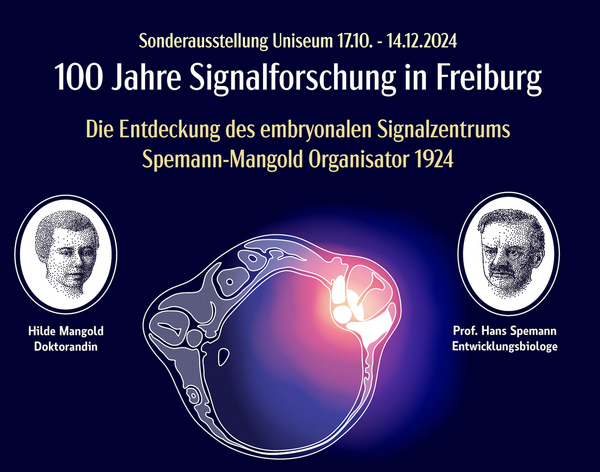

·
100 Jahre Signalforschung in Freiburg
Die Entdeckung des embryonalen Signalzentrums "Spemann-Mangold Organisator" 1924
Exhibition duration: 17 October to 14 December 2024
Opening: 17 October 2024, 3 pm c.t.
Location: Uniseum Freiburg, Bertoldstraße 17, 79098 Freiburg
Open during the regular opening hours of the Uniseum Thu/Fri/Sat 2-6 pm
Special guided tours: See announcements on the Uniseum website
Admission is free, exhibits are in German, English translation will be provided.
Organisation: Uniseum and CIBSS, Centre for Integrative Biological Signalling Studies
The discovery of the embryonic signalling centre 'Spemann-Mangold Organiser' was honoured with the Nobel Prize for Medicine and Physiology in 1935. Who were Hans Spemann and Hilde Mangold? How did a doctoral student's experiment lead to a Nobel Prize? What was the social and scientific context of the discovery? What is its significance for modern signalling research in biology and medicine?
The special exhibition at the Uniseum of the University of Freiburg is dedicated to one of the greatest scientific breakthroughs of the 20th century: the discovery of the so-called "Spemann-Mangold organiser", the signalling centre in embryos that coordinates their early development. One hundred years ago, Nobel laureate Hans Spemann and doctoral student Hilde Mangold performed groundbreaking experiments to show how embryonic cells organise themselves into tissues and organs. This discovery laid the foundation for the field of signalling research, which still shapes developmental biology today.
The multimedia exhibition features historical documents relating to the Nobel Prize as well as original specimens from 1921-1923, which Spemann and Mangold used to document their experiments. It provides contemporary scientific explanations for the continuing importance of signalling research in developmental biology, combines historical and modern scientific findings and invites visitors to discover the relevance of the Spemann-Mangold organiser for today's science.




